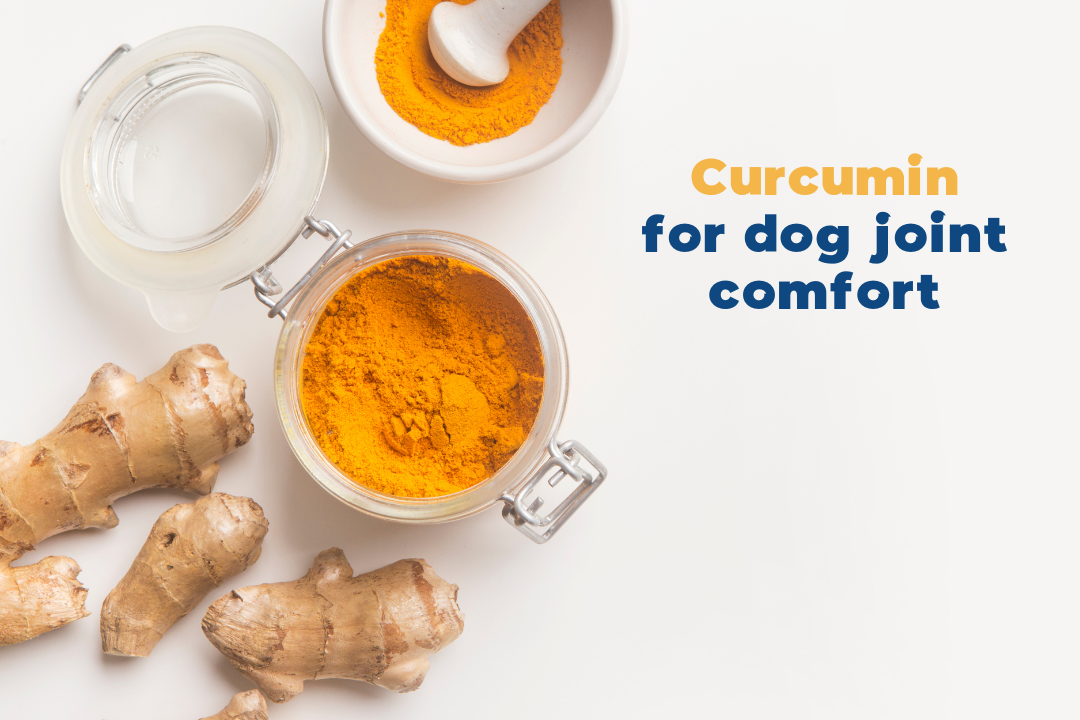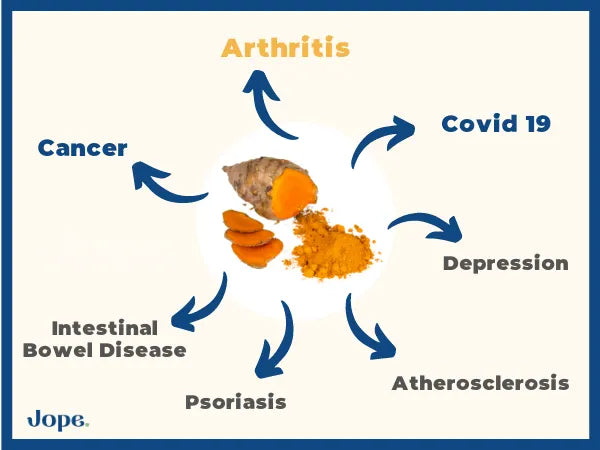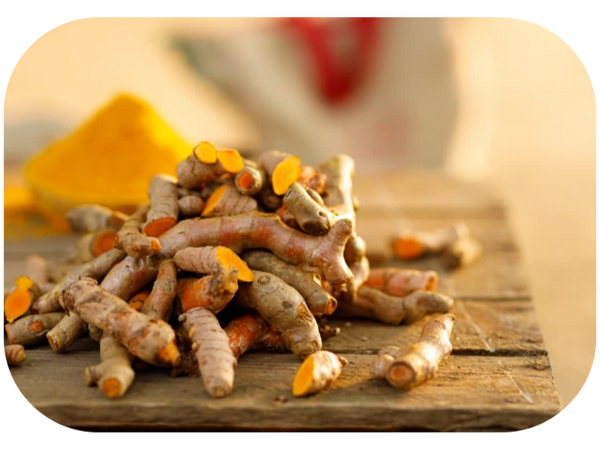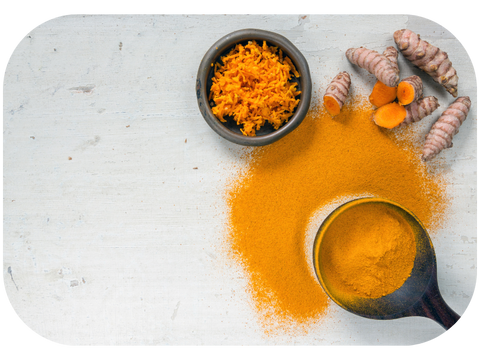No Products in the Cart
Is Turmeric (Curcumin) Helping Dogs With Osteoarthritis?

Hi, Jope's squad!
If you love to cook and have a particular sweet spot for Indian or Moroccan food, then you've already used and eaten curcumin. Indeed curcumin is one of the main curcuminoids present in turmeric, one of the spices that compose curry. In other words, curcumin is a component of turmeric.
In addition, curcumin has a yellow color that you can easily recognize, giving curry its unique color. Finally, you've most likely heard that turmeric has excellent health benefits and is a star ingredient in Ayurvedic cuisine. But do you know what these health benefits are?
4000 years of turmeric
used as a supplement.
Native to Southeast Asia, the use of turmeric dates back over 4000 years. It has been used as a dietary supplement in humans for a long time, both for preventative and therapeutic medicine. Research shows that turmeric is an ally to treat digestive disorders or relieve inflammatory diseases, such as osteoarthritis. Turmeric contains powerful antioxidants: curcuminoids, mentioned earlier, with the best known being curcumin. Let's dig into the properties of this plant with remarkable natural properties.
Key facts about curcumin
- Turmeric has been used for more than 4000 years
- Curcumin is studied for its uses against many diseases in human medicine
- Curcumin has natural anti-inflammatory and antioxidant properties
What is turmeric and what are its properties?
Turmeric, whose full name is Curcuma longa L., is a yellow rhizome. A rhizome is a continuously growing horizontal underground stem. Turmeric mostly comes from India. And for centuries, civilization used turmeric as a yellow tincture.
Nowadays, we are interested in studying turmeric's health and medicinal properties.
Recent in-vitro studies in humans and animals have explained the reason behind the traditional use of turmeric as a plant with natural anti-inflammatory virtues. The facination for this plant is obvious! Indeed more than 3000 preclinical studies have been conducted on turmeric, making it one of the most studied plants for its medicinal properties.
Turmeric is a rich source of phenolic compounds known collectively as curcuminoids, mainly curcumin, demethoxycurcumin, and bisdemethoxycurcumin.
The scientific teams concluded that turmeric, specifically curcuminoids acted as an anti-inflammatory. More precisely, by downregulating two pro-inflammatory enzymes (cyclooxygenases and lipoxygenases) and specific inflammatory molecules (inflammation mediators, such as Interleukins 1 and 6).
Curcuminoids' popularity is not likely to decrease. Indeed, curcuminoids, especially curcumin, are under the spotlight, and many scientific teams are studying them. In recent years there has been a growing interest in topics like cancer (a lot of positive preclinical data), inflammatory diseases, or even COVID-19. There are more than 2000 articles published each year talking about curcumin in medicinal reviews.

Human inflammatory diseases where curcuminoids studies are being conducted.
(source: Anti-Inflammatory Effects of curcumin in the Inflammatory Diseases)
What are the benefits of curcumin in dogs?
For humans and dogs, age often brings more chronic inflammatory diseases. These diseases often require anti-inflammatory drugs (NSAIDs or corticosteroids) to manage symptoms and provide a better quality of life.
However, these drugs can have serious secondary effects, so you should work with your veterinarian if your dog requires these medications to make sure you are monitoring your dog's symptoms accordingly.
In recent years, veterinary medicine has paid close attention to these secondary effects (usually affecting the guts and the kidneys) and has studied them. As a result, veterinarians now have a deeper understanding of the risk associated with anti-inflammatory drugs. And they have been using more adjunctive therapies over the years, such as herbal therapy.
The main benefits of curcumin in dogs are
its natural antioxidant and anti-inflammatory properties.
Curcumin is one of the most popular herbal therapy that your vet will recommend, especially for its benefits in chronic disease :
- Anti-inflammatory natural properties
- Type II collagen synthesis
- Antioxidant properties
Form studies done in-vitro, scientists showed that curcumin's anti-inflammatory natural properties resulted from a decrease in pro-inflammatory mediators and enzymes.
For those of you who enjoy "geeking-out," you'll probably be interested in the fact that the most important ones identified are COX2 (Cyclooxygenases 2), NO ( Nitric Oxide), Prostaglandins E2 (PGE2), Interleukins 6 and 8 (IL-6 and IL-8).
Is curcumin (found in turmeric) safe for dogs?
The answer is easy, and it's YES Curcumin is safe for dogs!
Curcumin's popularity for millennia and its ongoing use in veterinary medicine and pet food for over 20 years should make you feel great about its safety profile.

Is curcumin scientifically proven to help dogs with osteoarthritis?
In this case, the answer needs to be nuanced, and we will see why.
1. One study has demonstrated curcumin effects on reducing the expression of inflammatory genes
In a veterinary review, a team of scientists published a study in 2012 comparing the effects of curcumin to a non-steroidal anti-inflammatory drug (NSAID) and a placebo.
After 20 days of treatment, they clinically evaluated the dogs and took blood samples. They observed a significant decrease in transcripts from genes correlated to inflammation in both NSAID and curcumin groups but not in the placebo group. This was their conclusion: "The results would suggest that curcumin offers a complementary anti-inflammatory support for arthritis treatment in dogs."

2. Clinical evidence of curcumin's positive effects in dogs
There have been many studies made over the last 20 years.
According to the researcher's assessment, a 2003 study on 54 osteoarthritic dogs successfully demonstrated the benefits of curcumin in improving their condition.
Another study done in 2013 with 42 dogs on curcumin associated with tea extracts and collagen showed similar results: indicators of pain showed significant improvements, but the ground plate force did not. As a reminder, the ground plate force is an objective assessment of pain, which measures the pressure that a dog applies on his paw through the plate force.
Several studies have shown curcumin benefits dogs with osteoarthritis, but more studies are needed.
Suppose you read our other articles on UC-II and Omega 3. In that case, you will remember that they are the only two ingredients that have, to date, shown significant improvements in arthritic dogs when using objective measures such as ground reaction forces.
A 2016 study in Illinois showed improvement with curcumin on 20 dogs using dosing ranging from 100mg to 500mg per day.
Also Read - Pumpkins for Dogs
What the difference between curcumin and turmeric?
We've been referring to both somewhat interchangeably in our article. So you might be asking yourself, what is the difference between turmeric and curcumin? Well, turmeric is a yellow powder obtained from the rhizome of Curcuma Longa (a ginger family plant). This yellow powder is due to one of the main components of turmeric: the curcuminoids and, more specifically, curcumin.
We saw in this article that curcumin is responsible for its inflammatory and antioxidant properties. So if you want to give a natural supplement to your pet, curcumin will provide you with the best benefit. Indeed turmeric will typically contain about 2 to 5% of curcumin, the main active curcuminoid with anti-inflammatory properties. So if you use a curcumin product, you will get the pure and full benefits you seek ( and, let's face it, a "better bang for your bucks"). Furthermore, when buying a product containing turmeric or curcumin, you should look at the total amount (mg) of curcumin used, the active ingredient that will benefit you.


Why choose curcumin for dogs?
At Jope, we look for the most effective active ingredients to improve dogs' wellness. Our careful due diligence leads us to choose curcumin as the perfect second plant-based active ingredient to add to our formula when it comes to mobility.
Indeed we realized that our UC-II + Omega 3 formula would benefit from the curcumin's anti-inflammatory properties and action against COX-2
.
We believe that curcumin's natural and phytotherapeutic properties will act in synergy if our two other active ingredients, giving your pup the best chances to feel delightful once again! And we can't wait for you to tell us what you think of our yummy formula!


FAQs
What's the Difference Between Cooking Turmeric and Turmeric Supplements?
The main difference between cooking turmeric and turmeric supplements lies in the concentration of curcumin, the active compound that provides potent anti-inflammatory benefits. Regular cooking turmeric contains relatively low levels of curcumin—typically around 3%. In contrast, turmeric supplements with curcumin, such as Jope Hip & Joint Dog Chews, provide significantly greater therapeutic efficacy, as they are approximately 33 times more concentrated in curcumin than typical cooking turmeric.
This high concentration allows for targeted support of joint health and comfort, offering greater anti-inflammatory benefits specifically designed to help manage arthritis and joint discomfort in dogs.
How to Choose the Right Turmeric for Dogs?
When choosing turmeric for dogs, veterinarians recommend selecting products that are:
- Standardized for high curcumin content: Look for supplements with concentrated curcumin, the active ingredient responsible for turmeric's anti-inflammatory benefits.
- Formulated for bioavailability: Contrary to the common idea, black pepper didn't demonstrate an improvement in curcumin absorption in dogs.
- Veterinarian-formulated and clinically supported: Choose brands crafted specifically for dogs, like Jope Hip & Joint Dog Chews, which combine turmeric (curcumin) with UC-II® collagen and omega-3 fatty acids for complete joint support.
- Made in certified facilities: Ensure the supplement is produced is made in a SQF-Certified and NASC-approved or veterinarian-trusted manufacturing facilities for safety and quality assurance.
Avoid relying on regular cooking turmeric powder alone, as it is not concentrated enough for therapeutic benefits.
Can dogs have turmeric on a daily basis?
Yes, dogs can have turmeric daily if it is given in the correct dosage and veterinary-approved form. Daily administration of a concentrated and bioavailable turmeric supplement, like the curcumin used in Jope Hip & Joint Dog Chews, provides consistent anti-inflammatory support, helping manage joint discomfort and promoting long-term mobility and wellness. Always follow veterinary dosing guidelines to ensure safe daily use.
Can dogs eat turmeric in their regular food?
Dogs can eat small amounts of regular turmeric mixed into their food, but the benefits are very limited because cooking turmeric contains only about 3% curcumin. For dogs needing real joint health support, veterinarians recommend a highly concentrated curcumin supplement rather than relying on turmeric as a kitchen spice. Supplements like Jope Hip & Joint Dog Chews deliver the necessary therapeutic levels of curcumin, approximately 33 times more concentrated than regular turmeric, ensuring your dog receives effective anti-inflammatory support.

















Leave a comment